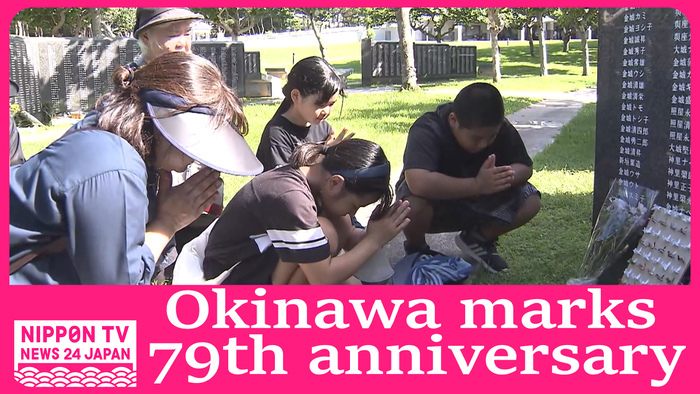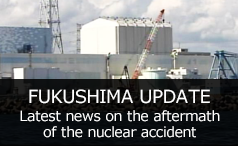Japan observes 79th anniversary of end of Battle of Okinawa

Japan observed on June 23 the 79th anniversary of what is believed to be the effective end of the Battle of Okinawa.
Prime Minister Kishida Fumio attended the annual ceremony at the peace memorial park for the third year in a row.
Bereaved relatives of the war dead came to the park to pray for the souls lost in the war.
They laid flowers by cenotaphs where the names of the war dead are engraved.
S/ Woman who lost her sister and relatives / My husband's legs have gotten weak. I think this will be last time for me to come here, too.
S/ Woman who lost her grandfather / There are wars occurring here and there even now. I don't want my descendants to experience such sorrow.
June 23 is designated as Memorial Day in Okinawa Prefecture, southwestern Japan.
More than 200,000 people from both Japan and the United States are estimated to have perished in the ground battle.
The victims include both soldiers and civilians.
The park is located in an area where fierce fighting took place toward the end of World War II.
People prayed for peace as fighting continues in other parts of the world like Ukraine and the Gaza Strip.
At the memorial ceremony, Kishida offered a flower and gave a speech.
S/ Kishida Fumio, Prime Minister of Japan / Passing on the tragic reality of the Battle of Okinawa and the preciousness of peace to younger generations is a responsibility that has been assigned to us.
At the same event, Okinawa Governor Tamaki Denny expressed concern over moves to strengthen the deployment of the Self-Defense Forces in his prefecture.
S/ Tamaki Denny, Okinawa Governor / SDF deployment is going through rapid expansion, and we residents of Okinawa Prefecture are very anxious. Is the current situation in Okinawa supposed to comfort the spirits of those who have sacrificed themselves while leaving behind regrets?
The Battle of Okinawa broke out in March 1945 and lasted for about three months.
Of those who died in the Battle of Okinawa, about 120,000 were residents of Okinawa, one-fourth of the prefecture's population at the time.


